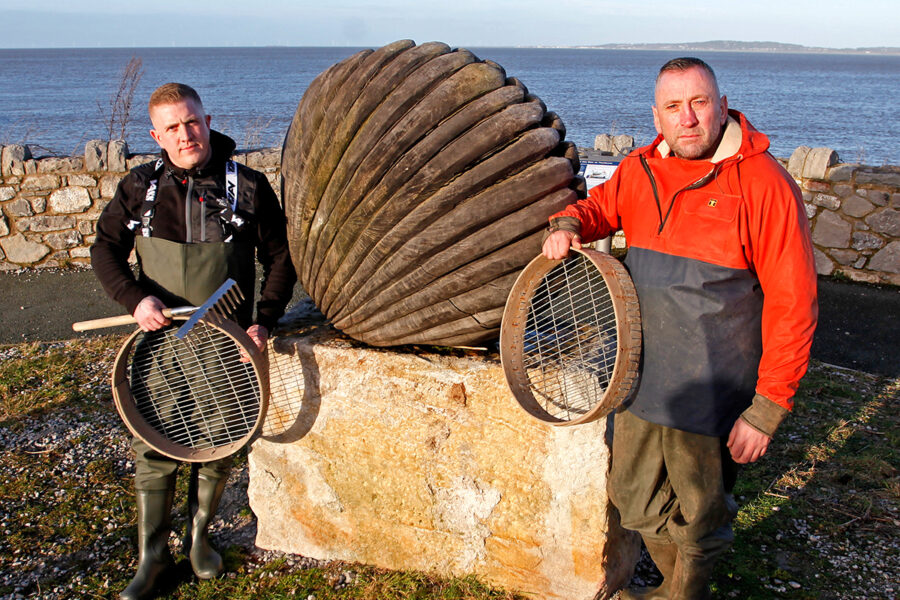Cockle gatherers have raised concerns about a new permit scheme for the Dee Estuary, which they believe could exclude them from the local industry, reports Geoff Abbott.
The application date for the new permit closed on Friday, 9 February, but traditional hand-gatherers say owners of registered fishing boats and qualified day skippers could be first in line.
Under the new system managed by National Resources Wales (NRW) and the Environment Agency (EA), licensed fishing boat owners will be awarded two points for every year of registration dating back to 1990.
A further five points per year will be awarded to commercial fishermen who can prove through tax returns that all or part of their income is earned in the industry.
Four points per year can be earned from cockle-gathering on the Dee, and three points per year for gathering anywhere else in the UK.
Controversially, a further two points per year are being awarded to qualified day skippers (or above), but the powerboat level two certificate required to qualify for a cockle permit is not recognised.
Cockle fisherman Mike Arrowsmith from Shotton said he is ‘furious’ that powerboat certificates are not recognised, and some boat owners can still earn points when cockle beds have been closed.
“Since 1990, the Dee beds have been closed for eight years, so dedicated cockle gatherers will lose 32 points straight away,” said Mr Arrowsmith, who has gathered cockles professionally for 14 years.
“Other beds have also closed, and Morecambe Bay has been closed for 13 years since 1990.
“Boat owners can still accumulate points when the beds are closed, but we can’t, and that’s unfair.
“The new points scheme is helping to keep the licences local, and I agree with that, but it does seem to prioritise the fin fishermen.
“That’s not good enough when you’re applying for a cockle licence, because a lot of boat owners only work part-time.
“I don’t have a permit for the Dee, so I can only earn eight points per year, but a boat owner can earn nine points a year or more,” he said.
In the past, a less accurate system saw many applicants qualify with the same number of points, so permits had to be issued using a draw.
The controversial ‘lucky dip’ led to many permits being issued to applicants in South Wales and beyond, and local gatherer Gary Jones, who lives in Flint, believes he missed out on an opportunity to work from home.
Environment officer Rick Pritchard, who works for Natural Resources Wales, said the previous points system used a ‘random draw’, which led to many local fishermen being excluded.
“Back in 2008, there was a system put in place to regulate the fishery and get an amount of cockle licences operating,” said Mr Pritchard, who was formerly the shellfish officer for the Dee.
“There were about 50 licences issued, but that raised a lot of concerns and ill-feeling at the time, which has lasted for a number of years. We had a five-year review of the fishery in 2012, which included an aspect of the cockle licence allocation. That came back inconclusive, so we did a second consultation, which came back with five options.
“None of those five options were particularly popular, so we came up with a sixth option. About 70 people signed up to that sixth option, which had been cherry-picked from all the other options. One of the major grievances had been that there were up to 50 people with the same number of points, and they had to be separated using a random draw.
“To get away from a random draw we’ve come up with a points system for fishing activity ranging from 1990 to 2018 where people can accumulate points for their involvement in the fishery. Whoever supplies the most evidence of their activity will be issued with a licence.
“We have gone through a more than normal consultation period, and people have been able to feed their ideas into that. We wanted to change to a cockle licence for people with a history of working on the Dee, because we can’t restrict it by postcode only.
“That has opened it up for local fishermen who know the beds, which is safer from a health and safety perspective. In the past, some licence holders have asked where the cockle beds were, and if they had been working on the Dee, that’s a question they wouldn’t be asking. Local fishermen know the dynamics and dangers of the Dee, and how to get to and from the beds in the dark, and that’s a lot safer,” he said.
For more news from Fishing News click here.








